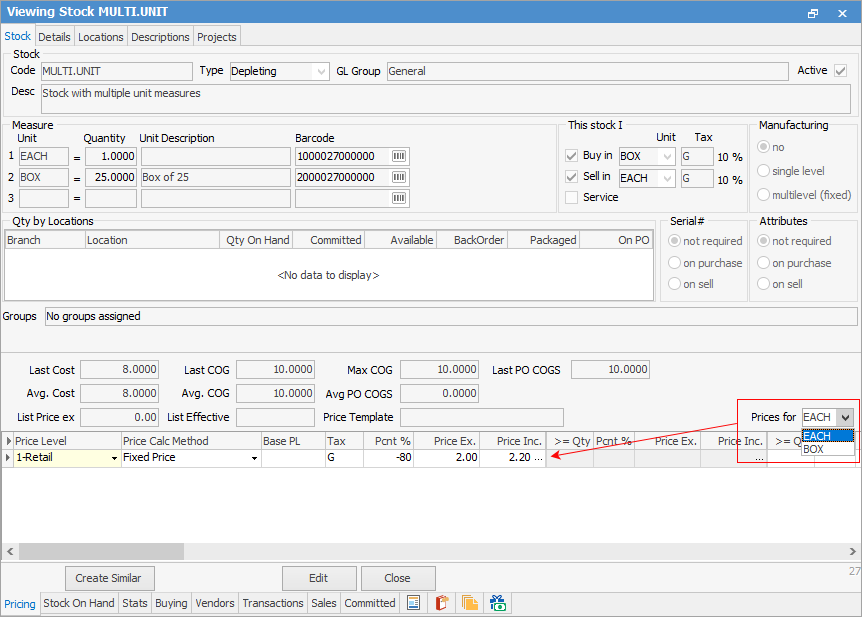Buying in one unit measure and selling in another requires additional setup in the stock header, Pricing and Vendors tabs (in the footer).
 |
Never change the unit measure on stock records when there is stock on hand, (most especially the base unit measure) as this will alter stock on hand quantities and values as well as the buy and sell pricing. |
Following is an example of two ways to set up stock based on price level when buying in rolls of 200 metres and selling in 1 metre lengths.
Measure Unit 1 is MTR Quantity is 1
Measure Unit 2 is ROLL Quantity is 200
I buy in is ROLL
I sell in is MTR
|
Note: Unit Measure 1 is always the Sell unit. |

Measure Unit 1 determines unit measure for quantity on hand values in the Qty by Locations grid.
Further examples:
▪Measure Unit 1 is EACH with a quantity of 1
▪Measure Unit 2 is BOX with a quantity of 5
More complex:
▪Measure Unit 1 is PACK with a quantity of 1 and unit description of .30 kg pack
▪Measure Unit 2 is BAG with a quantity of 83.33 and unit description of 25 kg bag. The quantity represents the number of Measure Unit 1 required to make up Measure Unit 2 - 83.33 x .30 = 24,999 kg.
|
Note: When using different unit measures, you cannot use Serial# on purchase/sell as Jim2 only allows this on individual unit measure.
If serial numbers are required on multiple unit measures the following will assist: ▪Create two stock codes, one for EACH and one for BOX. When you break a box, perform a stock adjustment for -1 BOX, and an adjustment up for the EACH +5. Keep the cost values the same, and the adjustments will be for $0. ▪Create a stock code for EACH only. When you receive the stock, it is received as 5 EACH and you can then record the 5 serial numbers. |
On the Pricing tab you will see in the far right a field called Prices for. Here you can select the different unit measures and the prices in the grid will change to show pricing for each unit measure.


Go to the Vendors tab, enter the vendor information and select ROLL as the Unit. Enter the Vendor List Price. Jim2 will calculate the Estimated Cost of 1 metre.

 |
Note that the vendor list price is the cost of the entire roll. The Estimated cost is the cost per metre. |
Example: Estimated cost + markup
There are two ways to work out the pricing:
1.What is the value required to sell this product per metre?

Using the above example of $1.25 cost, enter the sell amount per meter in the Price Ex. or Price Inc. column. Jim2 will calculate the markup percentage.
or
2.Enter a percentage in the Pcnt % column. Jim2 will calculate the prices.
Example: List – percent
Enter an amount in the List Inc. field, then enter the percentage in the Pcnt % field – Jim2 will calculate the List Inc price less the percentage entered.

Again, enter an amount in the Price fields if desired, and Jim2 will calculate the percentage.